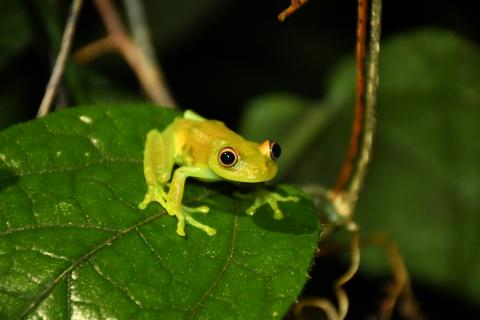£500k grant to explain the evolution of Amazonian biodiversity

The Open University has recently received £500,000 funding from The Leverhulme Trust to explain the evolution and distribution of biodiversity in the Amazon. The South American Biodiversity Evolutionary Reconstruction (SABER) project will integrate insights from present and past observational and genetic data with multi-million-year modelling of the climatic and environmental drivers of change.
Biodiversity loss threatens to undermine global health, food resources and carbon cycling, and is proceeding at a dangerously unsustainable rate in the Amazon, one of the world’s most species-rich and ecologically sensitive regions. With a colossal number of species, ecosystems and patterns, the Amazon plays a major role in global climate and carbon cycling. Currently, understanding and modelling of such ecosystems uses modern timescales, and although the Amazon region has been intensively studied for over 150 years, at present, there is still no comprehensive theory for its origin and maintenance.
The SABER project will look back 30 million years to create a process-based and unifying theory of biodiversity evolution, helping us to understand the Amazon in more depth. It will look at how this tropical ecosystem became and remains such a biodiversity hotspot, and what modelling this data can show us about species and ecosystems. This new modelling framework, built on data from fundamental processes, will support the pursuit of committed biodiversity targets.
The project is in collaboration with partners in South America, North America, Central America, Australia, and Copenhagen to collect data for more refined modelling. ‘Saber’, pronounced /sa'beɾ/ or /sa'βeɾ/, means ‘to know’ in the major South American languages Portuguese and Spanish, and the SABER project seeks to improve our understanding of one of the world's most critical tropical biodiversity hotspots.
The project team's expertise in this area was firmly established when the team published a paper in 2018 that looked at an adjacent hyper biodiversity hotspot, the Andes, and created models using information about the incredibly complicated terrain and climate. Looking at data from the last million years of heating and cooling (including ice ages) in the region, researchers were able to see the processes and movements of biodiversity across time. Using the same model in another hyper biodiverse location, the Amazon, was unsuccessful and gave birth to the need for the SABER project to understand the why.
Neil Edwards, Professor of Earth System Science, said “The hyper diversity in the Amazon is much greater than equivalent rainforests at the same latitude on the other side of the planet. We’re seeking to find out what makes the Amazon region so special, and what made the huge levels of biodiversity in the Amazon possible, by looking back on processes that took place over tens of millions of years. What we are trying to develop as a result, is a new evolutionary biodiversity model that you could apply anywhere in the world, which can then be interrogated through testing and calibrating the model – which means turning elements ‘on and off’ and seeing the resultant biodiversity picture. This will enable us to quantify the relative importance of ecological and evolutionary processes in driving the distribution of biodiversity in the Amazon and elsewhere.”
Pilot studies conducted by The Open University provide high confidence that the research will offer transformative insight for many groups of plants and animals, and will lead to development of appropriate, pattern-based metrics to quantitatively compare model and real-world behaviour. This understanding of how biodiversity behaves can then be built on to curb biodiversity loss and maintain and support healthy ecosystems across the planet.
Contact our news team
For all out of hours enquiries, please telephone +44 (0)7901 515891
Contact detailsNews & articles

The FUNdamentals: Why fun matters more than we think
In a world that feels increasingly serious and pressured, fun can seem like a guilty pleasure — something optional, even frivolous. But what if fun isn’t an add on at all? What if it’s essential?